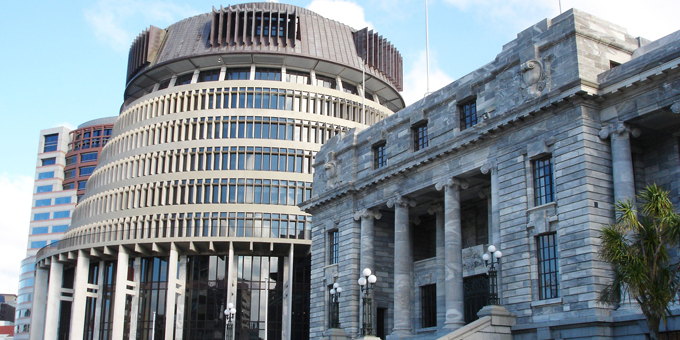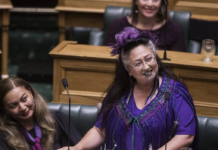Jacinda and Judith both wanted a 4 year term.
So do I.
Many New Zealanders have no idea that our single chamber Parliament makes it one of the most powerful Parliaments in the world.
You can read a piece of legislation straight into law with very little in way of check and balance.
That’s why we have 3 year terms, because the enormous power granted under a one chamber Parliament means you are required to keep that power in check.
The downfall of a 3 year term is that you can’t do anything in Power without an eye to the next 18month election cycle. The State ensures it has the real port and not the actual Government by stymying up reform and ensuring their fiefdoms are protected.
Turning to a 4 year term would allow Government’s to think longer term and would be able to push vested interests inside the state harder, but I also think we need to consider an Upper Chamber as well.
consider a NZ Parliament Upper House that has 50-50 representation between Maori and Pakeha. If Sovereignty was never signed away, then the Government of today has a responsibility beyond paltry compensation for past injustices , it must provide real power sharing solutions.
Having a 50-50 Upper House with the power to delay legislation that was not in the best interests of the Nation when it comes to Treaty issues would stop Government’s from fire sales of national assets and prevent things like the Foreshore and Seabed legislation from becoming law.
An Upper House would be seen as a guardian of the Treaty for the maintenance of public well being over private gain, it would show real power sharing and for Pakeha, it would represent a political body that protect their public interests as much as Maori interests.
…our 3 year short term thinking Government style has meant long term issues are never considered, a 4 year term with an Upper Chamber that protects Treaty Rights and Obligations would allow for Government with vision while ensuring there are checks and balances.
The desperate need for radical reform because of the climate crisis will demand the changes whether we like it or not.
Increasingly having independent opinion in a mainstream media environment which mostly echo one another has become more important than ever, so if you value having an independent voice going into this pandemic and 2020 election – please donate here.
If you can’t contribute but want to help, please always feel free to share our blogs on social media.






And that’s the danger in pushing for a 4 year term – that the prerequisites (such as an Upper House) will get put off and put off and never happen.
And it’s not just an upper house, but I’d suggest the need for what I commented on previously:
With all due respect for the likes of Jonathan Boston and others (often with vested interests), I can’t agree with Henry Cooke more:
https://www.stuff.co.nz/national/politics/300121309/election-2020-fouryear-political-terms-are-a-terrible-idea
The time to think about a 4 year term is AFTER [AFTER AFTER AFTER ]
– politicians cease passing legislation that breaches Te Tiriti and BORA (sometimes based on shit advice)
– when they find ways of properly resourcing and protecting the Ombudsman’s Office
– there is respect for the OIA with consequences for not doing so
– there are actual consequences when government departments and agencies break the law and when they actually act in the public interest at all times
– when there is a functioning 4th Estate with both non-commercial public service broadcasting and support for a diversity of voices
– and when we devise a system that’s more dynamic and suited to keeping up with the pace of change
( “Proponents of the four-year term generally structure their argument around how hard it is to really effect change in just three years. The public service takes a year to come up with a policy, you take another year consulting on it, and then by the time you want to do it the election is about to happen” )
– part of the problem is to do with people having a vested interest in preserving the status quo – especially in government departments and agencies
There’s already attempts to soften the electorate up for a 4 year term ( a referendum on the idea is apparently not such a good idea, etc. etc.), and maybe some are getting a bit frightened with the fact that before long it’ll be yoof taking the reigns of power – the generations that’ll be worse off than their parents.
[ AND AFTER AFTER AFTER your @Martyn advocacy for an Upper House ] otherwise we’ll get the 4 year term with (as you say) ” the enormous power granted under a one chamber Parliament” and the important bits won’t happen
Okay no. Despite the fact that the best Bomber can do is a generic hypothetical. You, OnceWasTim, then vaguely weave in unhelpful ideas about universal preferable behaviours that aren’t clearly defined or defined in different ways. The problem here is that you are so closed-minded to the idea of inching New Zealand towards a republic.
How strong are we if we have to wait until the old lady (Queen Elizabeth the 2nd) kicks it before we carve up her estate and claim New Zealand as our own state with one of us as Head of State?
It doesn’t help if you say every different significance of a thing three times because that’s problematic. But what luck that we have people like you to explain to us all of the wrongs with people like us governing ourselves.
It’s that your conclusion leaves a lot on the table when you say “the important bits won’t happen.” That’s just wrong. All over the South Pacific public health and education as well as border security is in dia straights and thanks to corona we are presented with a golden opportunity to address these issues and become a truly regional power. What’s problematic about that is the South Pacific Nations namely Samoa and Tonga have heads of states of there own made up of there own people and to even rise to the most elementary forms of statesmanship we to will have to elect a head of state of our own.
As it happens, I’d be happy enough if we put Madge out to pasture now – just so long as we work out what the relationship between Maori and a new Head of State (such as President) is, and in a way that the principles of the Treaty are protected.
I’d also be happy enough if an upper house was comprised of representatives from NZ’s districts and regions, or whatever arbitrary more localised division we devise (Once were “Provinces”).
I can’t actually imagine NZ with Charley Farley and his Horse after Madge pops her clogs
Yes well, first of all under a Republic the Maori electoral seats will be entrenched because 4 million kiwis assimilate 1 million Maori so representation must be capped to ensure that colonization can never be thought of again.
No, I believe that instead of publically electing a head of state, Parliament should elect one from there own ranks every 3 years. That way they won’t have 4 million non-Maori or 1 million Maori in the head of states ear trying to bring everything down on either or side.
If we don’t get the National Party in on this then a Republic won’t happen so they must have a shot every 3 (or 4 years or whatever) years at promoting there own head of state.
Whether or not Maori or non-Maori can trust a Republic I am not trying to squeeze out of it. But I think it’s better if the public try not to read into the details of how to create a Republic. Y’know when people say colonization or the government screwed everything up we deny all of the achievements in woman’s suffrage or anti-nukes or what we’ve managed to do to covid19.
No, I’m not looking for anyone to kiss anyone ass or have closer relations. Look at the system we have. Is that truly the best we can do and I believe Westminster should be thrown out. And now it must be replaced.
By the way @ Sam, How exactly are the ideas unhelpful? I.E. the ones where there are no consequences when our rulers breakk the law, OR when the existing few options we have for redress – such as recourse to the Ombudsman put people on a waiting list (or indeed when He’s denied access to Madge’s prisons to check on the state of things)
The floor is yours ………..
These are good ideas that should have been put in place 40 or 50 years ago.
I honestly think it is far too late now. So much damage has been done to the environment (both locally and globally), the education system, the health system, the broadcasting system, the economy and the social cohesion by the maniacs who have been in power since the 1970s that we are at the cliff edge and falling right now. And when I say maniacs I include the anti-environmental, BAU, neoliberal government of Helen Clark in the long list of fuckwits and liars that constituted the Roger Douglas government of the 80s and all that followed. Economic growth, carbon trading, immigration scams, housing bubbles, ‘free trade’…..all of it bullshit founded on banking and ‘economic’ philosophies that have no future because they destroy it. And all of it predicated on conversion of humungous quantities of fossil fuels into waste.
Even as I write we are being subjected to the same kind of bullshit by Adern and Robertson that got us into this diabolical predicament, the only essential difference between current and past narratives being that the current one is delivered with ‘kindness’.
It is abundantly clear that we were at the inflection point in 2019 -before the Covid-19 was even identified, let alone allowed to transition into a globally devastating pandemic. (There’s the sad irony: Covid-19 triggered the collapse of the system which was (is) self-defeating and would have collapsed within a few years anyway. Knocking out tourism and a lot of entertainment and corporatised sport etc. has given the Earth a slight respite from the ravages of industrialism and the life-threatening emissions it generates, and may even have extended our run as a species slightly.)
As I was saying, the inflection point was reached in 2019, notably when the American ‘repo’ market blew up and was saved [in the short term] by the Fed’s money-printing system.
I remember the fuckwit and lying sociopath Jenny Shipley telling us the way forward was via imports of second-hand vehicles and international trade conferences -APEC and all that. I can’t remember which year it was exactly…1997, 1998 or 1999….about the time the electricity supply to Auckland failed because top management refused to act on advice from mere underlings who pointed out the cables were not up to the job expected of them.
It’s all been downhill at an accelerating pace since then, of course, with the local Ponzi scheme being held up in the short term via international students and frantic conversion of potentially productive land into more dysfunctional suburbia. And lots of money-printing on the basis that the economy will grow and the interest will be paid, along with the capital, at some stage.
Whistle for that, I think, even at historically low interest rates that are spurring a frantic race for houses (the apartment sector now dead in the water).
As I was saying, the inflection point was 2019, and there is more evidence of that reported today, with a nice graph to look at.
https://www.interest.co.nz/news/107344/new-car-sales-activity-weakens-sharply-september-reflecting-weaker-economy-and-direct
I will personally be surprised if whoever forms the next government manages to hold it all together for more than a year without a major crisis of confidence due to the failure of practically everything.
On the financial side of things, the latest on Peak Prosperity article highlights the ludicrous situation we are now in, of having close-to-zero interest rates whilst at the same time attempting to operate a system that requires significant return on money invested.
‘At age 74, having lived through a number of economic booms and busts as well as having authored numerous books on the history of financial markets, Jim [Grant] sees the degree of speculation, overvaluation and malinvestment in today’s markets as about as bad as it’s ever been.
He lays much of the blame at the feet of the Fed and its global central bank brethren, who collectively through their intervention have suppressed interest rates to their lowest levels in all of recorded history.
(graph)
Needing income, investors will take imprudent risks to get it. And if 2% invites trouble, zero percent almost demands it.
Not only do 0% interest rates act as “molasses” on growth by gumming the system up with zombie institutions and toxic malinvestment, but it imperils the social good.
Savers and investors, increasingly desperate for yield, are forced to accept worse and worse choices in attempt to stay afloat.
Under this regime, the rich benefit disproportionately at the expense of everyone else AND it creates a “hyperinflation in the cost of retirement”. This accelerating war on the 99% can not stand for much longer without serious consequences and repercussions.’
https://www.peakprosperity.com/james-grant-why-market-risk-is-near-the-highest-in-history/?utm_source=dlvr.it&utm_medium=twitter
I don’t personally subscribe to PP but have been following Chris Martenson’s work since he produced the brilliant ‘Crash Course’ (ignored by the majority, of course) over a decade ago.
It is truly amazing to witness how disconnected politicians and the mainstream media are from reality, and we can only speculate on how much longer they can keep up the pretence their narratives have ANY validity.
You are right about dodge investments. Along with many others I lost money invested in finance companies all of which were recommended as save as houses by investment houses. They quickly vanished as the s— t hit the fan and my money vanished .
In the age of QE retirement investment returns of interest have been replaced by escalating commodity prices haven’t they AFKTT? Selling capital investments (shares) to live on is a bit like eating your house, but in times when interest rates have been higher cash deposits have fallen behind commodity prices anyway , so the retiree is eating their house either way.
And surely the loss of return on cash deposit is minor co- lateral damage in the desperate effort to stave off complete collapse of the whole financial edifice : which as you frequently point out is pending whatever they do.
And what would happen now if interest rates went back up to normal historical rates on the debt everyone is carrying now? It would be all over by lunchtime wouldn’t it!
D J S
Completely agree- the question is how do we select those in the upper house- for life? for a 10 year term? for the wealthy? for those a prominent standing in their communities? ex-politicians, judges? we are a small country and some parochialism is bound to occur. But we should have system that laws cannot be rushed through according to the passions of the day. NZers have shown they don’t trust politicians- the referendums taken thus far have confirmed that to date a 3 year term is all we trust them with. I suspect many NZers would baulk at the prospect of paying for an upper house- but maybe we could reduce the numbers of MPs sitting in the lower house in that case?
What about by ballot . with no citizen exempt. (4) years compulsory service; one year advance notice to get your affairs in order to allow the time off whatever you are currently engaged in.
D J S
This perspective from No right turn.
Status quo politicians want less democracy
I didn’t watch last night’s debate, in part because I’d made up my mind how I was going to vote months ago, and in part because two status quo politicians desperately spamming pre-scripted soundbites and zingers while failing to be meaningfully different in any way bores the shit out of me. But I was unsurprised to hear that both the status quo politicians on stage wanted to extend the Parliamentary term to four years. Its received wisdom among the Wellington political establishment that three years “doesn’t give a government enough time to get things done”, and so obviously it should be extended. Henry Cooke has spent some time demolishing this argument in Stuff today, but I think it is missing the point. Because the length of our parliamentary term is not about whether a government can “get things done” – something which seems to be no problem whatsoever when they actually want to do something – but about democracy and accountability. And a four-year term would undermine both.
The only question you need to ask yourself on this is “would you have wanted Roger Douglas to have an extra year to wreck the country”? Ruth Richardson? Winston Peters, with his vetos and foot-dragging? (Feel free to insert your political hate figure of choice). A three year term lets us veto them, and throw them out of office or saddle them with a difficult coalition partner if we don’t like what they’re doing. It is our sole effective means of keeping the politicians accountable and under control. And we should not let them undermine it.
Remember that the electorate did give Roger a second term. Rather in the sense of an unplanned pregnancy. Ie we’ve done it now, better see how it turns out rather than an abortion at this late stage. But it is significant in this context that he did get the second tern to complete the job. It has been seldom that a government has not been given that second term in history , if not two more terms. Perhaps all that is needed to address the problem is for political parties to be more realistic in what they undertake to do in the first term. Normally they promise a programme that no one really believes anyway as anyone can see the promises are unrealistic in the time allotted .
D J S
It’s been found that the countries that have done the best with Covid are the ones, amongst other factors, that do NOT have upper house’s. The US it’s probably the best example and reason to avoid this.
Personally having another layer of politicians in anything playing politics, using pandemics or whatever the lower house want as bargaining chips is not the way forward.
Agree though on 4 year terms, with a binding referendum this revisit after 3 terms.
It is nice to agree . A four year term would be good and I see sense in an upper chamber but how would it be made up. Would it’s members be appointed or elected. The upper house in UK is made up of lords and ladies . I cannot see that working in NZ.
Even in tye UK the threat to swamp the Lords with Left or Right leaning members has been held as a sword over efforts to stymy a bill. Would Maori vote for their members as I can imaging this who lead to fights over who represent who as there is still big division on a tribal basis . I would be interested in a Maori’s opinion on this.
Imagine the horrid choices we would have for the upper house. Think all the aholes on the other side of the political equation and thaaaat is you upper house NZ style.
Like the supercity in theory ok – in practice diabolical
Comments are closed.